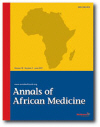
|
Annals of African Medicine
Annals of African Medicine Society
ISSN: 1596-3519
Vol. 8, No. 2, 2009, pp. 122-126
|
 Bioline Code: am09027
Bioline Code: am09027
Full paper language: English
Document type: Research Article
Document available free of charge
|
|
|
Annals of African Medicine, Vol. 8, No. 2, 2009, pp. 122-126
| en |
Vesicovaginal fistula: Do the patients know the cause?
Hassan, M A & Ekele, B A
Abstract
Background : So much has been written on vesicovaginal fistula (VVF) but there is little on the patients′ perspective of the condition. The objectives of this study were to determine the knowledge of patients who have developed VVF on the causes of the fistula and their attitude toward measures that would prevent future occurrence.
Methods : The questionnaire-based survey was conducted on VVF patients on admission from June to August 2003 at Maryam Abacha Women and Children Welfare Hospital, Sokoto, Nigeria. The case notes of the patients were reviewed after the interview to match the responses from the patients with those documented in the folders. Focus group discussions were held with the maternity staff to ascertain the content and quality of existing counseling.
Results : One hundred and thirty patients were studied out of which 121 (93%) had no formal education. Teenagers constituted 37%, while 57% were primiparae. Thirty-five (27%) patients were divorced or separated because of the VVF. There were seven cases of recurrence after a previous successful repair. Prolonged obstructed labor was the cause of the VVF in 110 (85%) patients and 77 (70%) correctly attributed their problem to the prolonged labor. The 33 patients who could not identify the prolonged obstructed labor as the cause either attributed their condition to God/destiny or to the operation that was done to relief the obstruction and therefore would not have hospital delivery in their subsequent pregnancies. From the focus group discussions, it was confirmed that pre and post-operative counseling were inadequate.
Conclusion : Even though majority (70%) of the patients knew the cause of their fistula from the health talks, some (32%) would still not change from risky obstetric behavior. Mandatory provision of accurate and appropriate information and education to all VVF patients and their relatives or spouses by trained counselors should be ensured. Such information and education should emphasize the etiology and management of obstetric fistula in order to prevent a recurrence.
Keywords
Cause, knowledge, patients, vesicovaginal fistula
|
| |
© Copyright 2009 Annals of African Medicine.
Alternative site location: http://www.annalsafrmed.org
|
|
